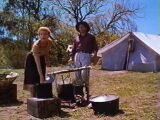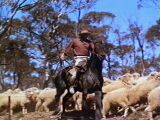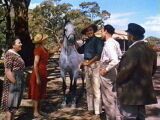The Sundowners
1960 US
Dir: Fred Zinnemann
Str: Robert Mitchum, Deborah Kerr, Peter
Ustinov, Glynis Johns



Australia. What a beautiful country! The Sundowners depicts this
very beautiful country as it is.
"The Sundowners" is an astonishingly beautiful movie. All scenes
being shot in Australia, you, by watching this movie, will certainly be able to feel the strong force of the sun
shower in Australia, and easily understand that the richness in the fauna and the flora in Australia surely comes
from this abundance of powerful sun energy. Throughout the movie, the weather seems to be always bright and clear,
and it is as if suggesting there was no rainy or even cloudy days in Australia. Although, of course, Japan, where
I live, has its own nature too, this richness and intensity of Australia's nature seems to be completely different
from the ones of Japan. In this regard, I consider there are two kinds of natures. One is real nature that preserves
the raw state of natural environment and has never been touched by human intervention. The other is tamed nature
that has been altered by human meddling to fit it to their convenience. In Japan, as its land area is very small,
all the places but several very small parts have been completely developed and irrigated. If you ride on trains
in Japan, and go to many many places, you will surely know what I am saying. No wilderness at all, That's what.
Therefore, when we mention the word "nature", usually it means this tamed and artificial nature whether
or not we notice the fact. On the other hand, Australia seems to have the abundance of nature in the former meaning
as well as in the latter one. In the SF movie (and the novel) "On the beach"(1959), Australia is the
last place nuclear contamination comes that eventually leads all living forms on this planet to extinction. Probably,
this honored selection of Australia as the last surviving place might be reflecting the thought that Australia
should be the most suitable place for nourishing and preserving many life forms. Also, in the movie "The Sundowners",
you can see through camera eyes many life forms preserved under the bright and lush environment. I consider that
this alone can make the movie worth watching. However, what I want to say the most in this review is slight different;
that is, I want to say I've noticed the mental inclination according to which one can stabilize own mental as well
as geographic structure is quite different between in Japan and in Australia. The difference probably could be
attributed to the difference between a nomadic culture whose prominent characteristic is an itenerant living style
and an agricultural one whose prominent characteristic is to settle down in one place. Japan is a typical country
that should be classified in the latter category. Though I will explain this later by mentioning some Japanese
movie series, in Japan, even if a nomad-like life can be a someone's dream, it is absolutely alien to traditional
Japanese way of thinking.
For Robert Mitchum who is essentially a nomad, settling down
means nothing but getting stuck.
In this movie, Robert Mitchum plays a sheep driver. Hence, he is always wandering
around all over Australia, which means he is certainly a born nomad. Although his wife (played by Deborah Kerr)
wants to settle down, he seems to have no intention of doing so, because, for him, settling down means nothing
but getting stuck as he says several times in the movie. In an earlier scene, when Kerr asks him a question "How
many acres do you own?", he answers to it by saying "All of Australia, that's I own. The rivers, the
plains, all of it.". We ought to be very careful about the fact that the meaning of the word "own"
is quite different between him and his wife. For him, "own" doesn't necessarily mean personal possession
or private property. Because, for him, private property is not so important. By saying so, I don't mean he is a
communist. Essentially communism is an idea that is an anti-thesis of capitalism. But, in his case, from first,
there is no such notion like capital, which is only possible to arise when the notion like private property takes
into effect. Therefore, he is manifesting that he is devoid of such a notion like personal possession when he says
he owns the whole Australia. On the other hand, obviously Kerr isn't a born nomad. The reason why she wants to
settle down is because itinerant living is completely unfamiliar to her whole existence, and, therefore, her anxiety
about living a nomad life mainly comes from her inherent disposition, and thereby by no means only from logical
guesses like living a nomad life would be completely precarious. But, the same is true to Mitchum in the reverse
way. His whole existence is entirely molded by his life as a nomad, and hence, for him, settling down in one place
means he must change completely, and discard most of his already acquired identity.
Settling down in one place is totally different from a normadic way
of life not only in the meaning of life style, but also in the
one of
perceptual patterns.
At this point, it should be added that settling down in one place is totally
different from a nomadic way of life not only in the meaning of life style, but also in the one of perceptual patterns.
Settling down, at the same time, means introducing a fixed point in one's vision toward everything. And it forces
the persons who employ it to see everything from the view point that originates in that fixed point. Conversely,
a nomad life makes it difficult for persons to form this fixed view point due to their everlasting itinerant life.
And this lack of the fixed view point prevents persons from forming the notion like private property, for, only
through the fixed view point, one can demarcate a certain area as his own territory from others. If I dare to say
in one ward the way of thinking of a nomad, it would be simultaneity and ubiquity. When he says he owns the whole
Australia, probably he is saying he can be anywhere in Australia at any time. No matter how it seems to be impossible
for us non-nomads, it's definitely possible to him, for his vision is never organized in a chronological order
that also requires the fixed view point. For example, he likes gambles. Losing much money doesn't have so much
meaning for him much less having surplus money by saving it. It should be well considered that, if there was no
fixed view point, what would be the point of considering having money at any future time that is completely equivalent
to the present. On the other hand, Kerr is always trying to save money in a jar, and wants to have their own firm
in some future day. This is suggesting she is always thinking from the fixed view point, that originates in the
present time and stretches forward to the future. Therefore, losing money could jeopardize her entire view and
entire life that was structured according to her scheme. Thus, as you can see, the difference between Mitchum and
Kerr is tremendously huge.
Japanese movie series "Otokowaturaiyo" is well reflecting
Japanese traits as an agricarural race despite the fact that
the
principal character Tora-san is supposed to be living like a
nomad.
Up to this point, I have explained how vast is the distance between a normadic
way of thinking and an agricultural one. I am going to explain it further by referring to the Japanese movie series
"Otokowaturaiyo", which means it's hard to be a man in Japanese. This movie series is very famous in
Japan, though I think it is not so famous in foreign countries compared to the works made by the renowned Japanese
directors such as Akira Kurosawa or Yasujiro Ozu. Although the popuarity of this movie series in Japan might be
able to be attributed to the fact that the movies are reflecting Japanese mentality quite well, I am not going
to discuss it here, for, for foreigners most of whom I suppose has never watched this Japanese movie series, I
presume it would be no use of hearing such an argument. Anyway, this movie series depicts a person called Tora-san
(played always by a Japanese actor Kiyoshi Atsumi) who is supposed to be always wandering around all over Japan.
The reason why I said "supposed to be" is because the movies of this series always (I must confess that,
as I haven't seen all of the movies of this series, saying "always" might be improper) start at the point
where Tora-san comes back from his "suppose to be" wandering journey to the house where he was born.
The house is located upon in an ordinary town called Shibamata in Tokyo. In short, the stories always revolve around
this fixed place Shibamata, even if Tora-san is supposed to be living like a nomad. I consider this reflects the
situation in Japan very well. As I said before, from first, Japan is an extremely tiny country. This fact makes
it practically impossible to live like a nomad in Japan, for all the places are always studded with people, and,
hence, highly centralized agriculture has been the best solution to live in Japan, which eventually has fostered
Japanese traits as a settling down agricultural race. Therefore, despite the fact that this character Tora-san
could be considered as some kind of symbol for Japanese's craving for a nomad-like life, it will never be possible
in Japan in the real life. As this movie series suggests, even when they are thinking a wandering life, there is
always the fixed point in the center of their mind to which they can come back any time. This is completely opposite
to the life of Robert Mitchum in "The Sundowners".
Are sheep actually hopping like athletes as shown in this movie?
But, such kind of life wouldn't be possible without the support from nature.
Australia has the richness in its nature as I said in the first paragraph. The movie "The sundowners"
is definitely succeeding in conveying the message that such a life is possible by showing the beautifully recorded
scenery of Australia. Although I think this movie is slightly long (about 130 minutes), probably you might even
be unaware of the passage of time by just watching marvelous scenes of Australia. Finally, I would like to say
I want to know whether the scene where a bunch of sheep are hopping with athlete-like supple dexterity is some
kind of camera trick or actually they do such a thing. Teach me if you happen to know.





